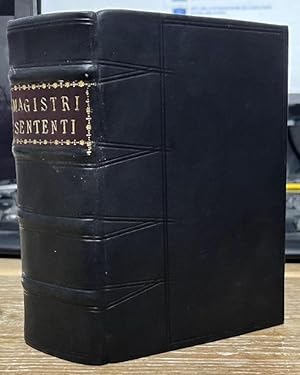Descripción
Small thick octavo. [5.50 tall x 4.00 wide x 2.00 thick]. Collates fol. i-ccxiii, [12 leaves], fol. i-clxxxiiii, [43 leaves]. Title in red & black. Imprint date & details to the rear of leaf clxxxiiii at the close. A very good, clean and crisp copy. Minimal light marks or blemishes only else a very nice copy indeed. Worldcat gives a matching collation however they note only 32 leaves at the close whereas this copy has 43 leaves [possibly lacking a terminal blank as finishes on Ddd7]. Peter Lombard, Peter the Lombard, Pierre Lombard or Petrus Lombardus, (c. 1096, Novara, Lombardy 21/22 July 1160) Paris, France was a scholastic theologian, Bishop of Paris, and author of Four Books of Sentences, which became the standard textbook of theology, for which he earned the accolade Magister Sententiarum. Peter Lombard was born in Lumellogno (then a rural commune, now a quartiere of Novara, Piedmont), in northwestern Italy, to a poor family. His date of birth was likely between 1095 and 1100. Peter Lombard wrote commentaries on the Psalms and the Pauline epistles; however, his most famous work by far was Libri Quatuor Sententiarum, or the Four Books of Sentences, which became the standard textbook of theology at the medieval universities. From the 1220s until the 16th century, no work of Christian literature, except for the Bible itself, was commented upon more frequently. All the major medieval thinkers, from Albert the Great and Thomas Aquinas to William of Ockham and Gabriel Biel, were influenced by it. Even the young Martin Luther still wrote glosses on the Sentences, and John Calvin quoted from it over 100 times in his Institutes. Though the Four Books of Sentences formed the framework upon which four centuries of scholastic interpretation of Christian dogma was based, rather than a dialectical work itself, the Four Books of Sentences is a compilation of biblical texts, together with relevant passages from the Church Fathers and many medieval thinkers, on virtually the entire field of Christian theology as it was understood at the time. Peter Lombard's magnum opus stands squarely within the pre-scholastic exegesis of biblical passages, in the tradition of Anselm of Laon, who taught through quotations from authorities. It stands out as the first major effort to bring together commentaries on the full range of theological issues, arrange the material in a systematic order, and attempt to reconcile them where they appeared to defend different viewpoints. The Sentences starts with the Trinity in Book I, moves on to creation in Book II, treats Christ, the saviour of the fallen creation, in Book III, and deals with the sacraments, which mediate Christ's grace, in Book IV. Peter Lombard's most famous and most controversial doctrine in the Sentences was his identification of charity with the Holy Spirit in Book I, distinction 17. According to this doctrine, when the Christian loves God and his neighbour, this love literally is God; he becomes divine and is taken up into the life of the Trinity. This idea, in its inchoate form, can be extrapolated from certain remarks of St. Augustine of Hippo (cf. De Trinitate xiii.7.11). Although this was never declared unorthodox, few theologians have been prepared to follow Peter Lombard in this aspect of his teaching. Compare Pope Benedict XVI's encyclical Deus caritas est, 2006. Also in the Sentences was the doctrine that marriage was consensual and need not be consummated to be considered perfect, unlike Gratian's analysis (see sponsalia de futuro). Lombard's interpretation was later endorsed by Pope Alexander III, and had a significant impact on Church interpretation of marriage. Bound in a very attractive new black full calf binding with blind lines to the spine and boards. Raised bands and a hand-tooled, gilt-lettered label to the spine. MULTIPLE ADDITIONAL PHOTOS AVAILABLE. PLEASE CONTACT ME TO REQUEST. N° de ref. del artículo ABE-1691503950849
Contactar al vendedor
Denunciar este artículo
![]()




